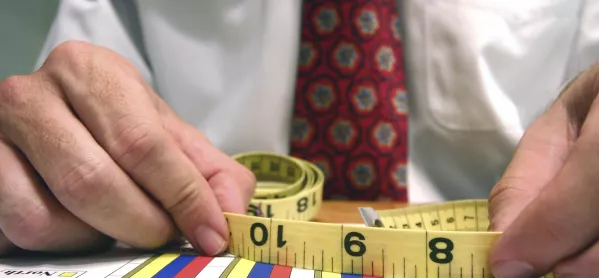- Home
- We should measure what we value, not value what we can measure
We should measure what we value, not value what we can measure

So Pisa (the Programme for International Student Assessment) and Timss (the Trends in International Mathematics and Science Study) are over for another year, although the debate about the international rankings will continue for some time, especially in countries that scored poorly. The latest results again show East Asian countries in the lead, but some Western countries performed well - Finland (again), Canada, Estonia and Ireland.
In Pisa, the UK has dropped one place in maths and risen by one in reading - still in a mid 20s position in the international league table. The results for children in Scotland and Wales will cause considerable thought in Edinburgh and Cardiff, where being behind England in education is as unwelcome as losing to them at rugby. As they look at the policy confusion south and east of their borders respectively, will they go for greater centralisation of policy and more national assessment, or increased autonomy for schools?
How well children do in maths, science and their mother tongue is extremely important, but there are many factors at work that cause results to be so different in different countries, not least the attitude of parents to education, so replication of what is done in Singapore or Shanghai or Finland is not necessarily the answer. Context is important.
Even more essential than chewing over the results and changing national policy is the recognition that Pisa and Timss do not tell the whole story.
More than international rankings
For schools that place a high priority on giving every learner a fully rounded education, it is important to measure progress in more than academic terms. Education should be more than the pursuit of good test results.
Even the Organisation for Economic Cooperation and Development (OECD), which administers the Pisa tests, agrees. OECD education director Andreas Schleicher has admitted that “today schooling needs to be much more about ways of thinking, involving creativity, critical thinking, problem-solving and decision-making”.
Alas, too much of education - from ministers, civil servants and inspectors to school leaders and teachers - results in valuing what we can measure, instead of trying to measure what we value.
Yes, we value maths and science and reading, but this should not be to the exclusion of so much else of value in the educational journey of young people.
The curriculum should drive assessment, not the other way round. The assessment tail too often wags the curriculum dog.
I look back with fondness to the early years of the General Certificate of Secondary Education (GCSE), from its introduction in 1986. GCSE syllabuses were planned by subject experts and the structure of the GCSE examinations reflected the curriculum in its balance of terminal examinations, coursework and practical tests. Different subjects had different assessment patterns, as appropriate. Certificate of Secondary Education (CSE) Mode 3 was another golden era of curriculum-led assessment.
Throughout the rest of the 45-year period during which I have been a first-hand witness of education policy, assessment has led and curriculum has followed.
Dependence on testing
Driven by accountability from central government, the teaching profession has been the unwilling accomplice to the growth of dependence on narrow external terminal examinations and tests.
The message from Whitehall is clear: the skill of passing exams is valued above other educational knowledge and skills.
Pisa and Timss, and the reaction to them, add to the pressure on schools to resist their moral purpose in nurturing all kinds of talent and providing a broad and balanced education.
Schools in the Whole Education network are, in their different ways, providing children and young people with a fully rounded education, believing that, if parents are willing to pay many thousands of pounds a year for the best independent schools to do this, they should do so in state schools for their less advantaged clientele.
These schools are experimenting with a range of approaches to support school self-assessment of the wider purpose of education at both a school and individual student level. This type of test is used by higher education to measure the extent to which applicants for undergraduate courses in health and other sectors would be likely to complete the course and be successful in the work place. The approach can be used by schools, too.
A visit to Australia in 2016 convinced Jim Knight - former schools minister and now chief education adviser to TES’ parent company, TES Global - of the need to move to an examinations system that better reflects the needs of the 21st-century labour market. In an article on the TES website, he quotes Charles Leadbeater on the need for assessment to reflect a broader education and “go beyond testing routine facts to test higher-order thinking, problem-solving and creativity”. Good examinations, especially at A level, already do that, but GCSEs and national tests do not.
If we value a broad curriculum, let us work as a profession to find ways of measurement that are as good for the development of skills as they are for maths, science and reading.
John Dunford is chair of Whole Education, a former secondary head, general secretary of the Association of School and College Leaders and national pupil premium champion. He tweets as @johndunford
Want to keep up with the latest education news and opinion? Follow TES on Twitter and like TES on Facebook
Keep reading for just £1 per month
You've reached your limit of free articles this month. Subscribe for £1 per month for three months and get:
- Unlimited access to all Tes magazine content
- Exclusive subscriber-only stories
- Award-winning email newsletters



